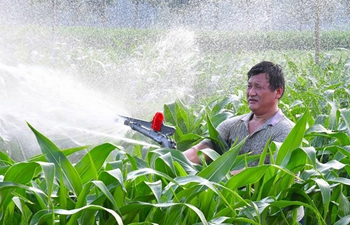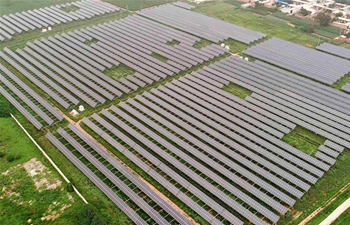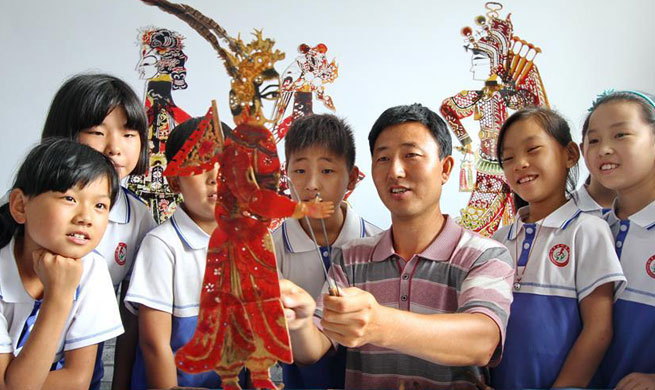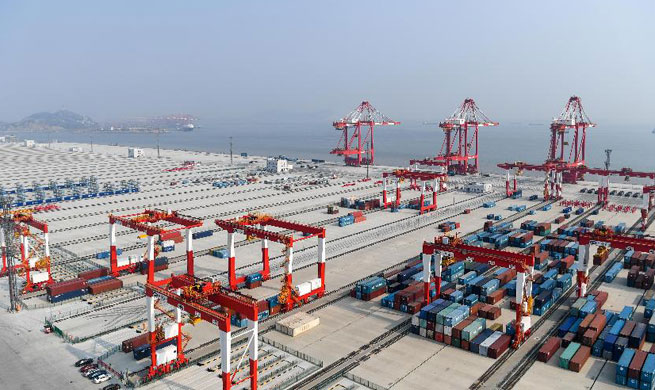JUBA, July 26 (Xinhua) -- The economic hardship in South Sudan has pushed young girls to become family bread winners in a country regarded as highly patriarchal.
The young girls have been forced to take up the role due to political conflict that has led to displacement of people and economic crisis that has caused humanitarian catastrophe.
Kuei Madut is one such young girl that has taken up the role with the zeal of the boy child in a given South Sudanese family set up.
"I am a first born in our house, and I have taken the responsibility of helping my siblings since our polygamous father earns less than 100 U.S. dollars," the 28-year-old Madut told Xinhua in a recent interview.
Owning a small restaurant in Juba along Hong-Kong Street in the country's capital, Juba, Madut told Xinhua that her large polygamous family propelled her to do the business, in spite of her Dinka cultural norms forbidding girls engaging such ventures before marriage.
Madut, a high school graduate, said that despite making the bold move albeit unknown to her at the time of starting the business, the increasing price of commodities has become unbearable.
"Given that commodities in this country are imported in U.S. dollar against the low rated South Sudanese pounds, businessmen like me are seriously suffering," she noted.
According to Madut, she currently earns less than 100 dollars courtesy of the economic crisis in the country that was seen by many upon attaining independence in 2011 as the most prosperous country in Eastern Africa region.
Madut noted that she will soldier on even as the violence continues to keep people away from their homes, ransacked markets and disrupts planting, all of which keeps families from getting the food they need to survive.
South Sudan has been going through conflict since December 2013, following political dispute between President Salva Kiir and his former Deputy Riek Machar.
The conflict has led to the death of thousands as more than 2 million remain displaced. A handful of peace agreements have been signed over the course of the war but they have been repeatedly violated.
While some regions have recently become slightly less volatile, allowing people to move around fairly freely and conduct their businesses has become unpredictable.
Most recently, a fresh wave of violence erupted in Juba starting July 2016, just one day before the country's five-year anniversary of independence.
The country's economy is also in crisis as the South Sudanese pound has declined in value, making the cost of goods and services to skyrocket. The inflation rate at 835 percent is believed to be the highest in the world.
With restricted access to jobs, income, land, agricultural inputs and other resources due to the crisis, it is an everyday challenge for South Sudanese to feed their families.
"I opened a salon business after the two news magazines I started were crippled by the high costs of printing as a result of economic crisis," 31-year-old Rachel Aguer, a former publisher said.
Aguer is a South Sudanese journalist and a founder of Real Woman Magazine and a former editor in chief of SHE magazine. She hails from a monogamous family as the only person holding responsibilities before marriage.
She however said that the saloon business is capable of generating her money for her daily up keep.
Aguer called on girls to join the income generating group to help salvage the situation by saving their suffering parents and stop thinking that boys are made to shoulders family's responsibilities.
Economists in the country have projected that the South Sudanese inflation stands closely to 300 percent, making it the highest in the world currently.



















